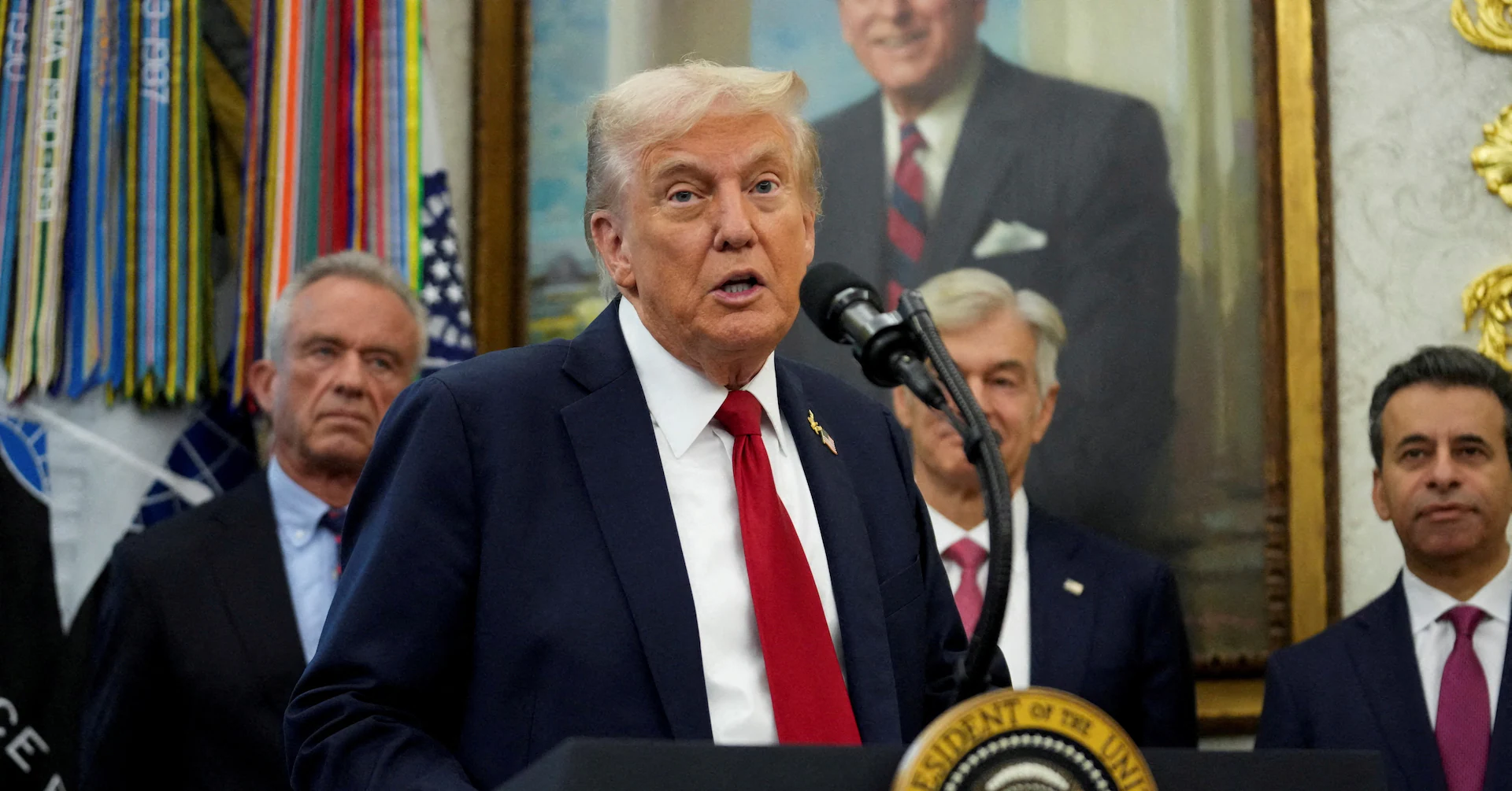
WASHINGTON, Oct 2 (Reuters) – As President Donald Trump’s regulators revamp bank rules, big lenders expect their capital requirements could fall, in a stunning victory for the industry which faced a big hike under former President Joe Biden, according to senior industry executives.
Aiming to cut red tape that Trump’s agency picks say is hurting the U.S. economy, they are working on the most sweeping overhaul of U.S. capital rules since the global financial crisis of 2008.
Sign up here.
In addition to narrowing the “Basel Endgame” capital hikes which sparked unprecedented pushback from Wall Street banks, the Fed plans to reduce a capital surcharge levied on risky global banks, shrink a key leverage constraint, and overhaul annual tests that gauge whether lenders can withstand an economic shock.
The country’s largest lenders, which have lobbied hard for the long-sought review, are optimistic that the changes combined will result in their capital levels remaining flat or falling, said six industry and regulatory sources, including three top bankers.
That expected outcome, reported here for the first time, marks a dramatic turnaround for the industry which faced a 19% hike in 2023 under the draft Basel capital rules which proposed changes to how big banks gauge lending and trading risks.
While the Fed last September said that hike would be halved, the plan was never finalized and died with Trump’s election.
Big banks have long complained that capital rules are excessive and poorly calibrated, and that some of that cash could better serve the economy through lending. They also argue that they weathered the COVID-19 economic shock just fine.
Critics say efforts to chip away at the capital regime are dangerous, and could leave the industry vulnerable at a time when the outlook for the U.S. economy is growing cloudy.
“You’re going to see here the most aggressive streamlining or easing of bank regulations that we’ve seen certainly since Dodd-Frank and probably sometime before that,” said Ian Katz, managing director at Capital Alpha Partners, referring to the landmark 2010 post-crisis law that overhauled bank rules.
A spokesperson for the Fed’s new regulatory chief, Michelle Bowman, who is leading the overhaul, declined to comment. Bowman said last week that she wants the rules to “work well together” and did not necessarily expect capital to fall. Regulators will unveil a new Basel draft by early 2026, she added.
The Office of the Comptroller of the Currency and Federal Deposit Insurance Corporation, which are also working on the Basel draft, also declined to comment.
“America’s largest banks are the strongest in the world,” said Amanda Eversole, CEO of the Financial Services Forum which represents the country’s eight biggest banks. “Modernizing capital rules will let them put that strength to work – fueling growth for consumers, small businesses, and the economy.”
‘EXTREMELY CONSEQUENTIAL’
The sources, who declined to be identified discussing confidential regulatory issues, said they expect the new Basel draft to be broadly “capital-neutral” at a minimum. That means it would neither increase nor decrease system-wide capital, but change how it is distributed.
To get there, regulators are expected to abandon a “dual stack” that would have required banks to comply with the stricter of two methods for measuring their risk capital which penalized banks with large trading businesses, and to ease a requirement to put capital aside for operational risks, like cyberattacks or lawsuits, two of the people said.
Capital reductions could then come as the Fed updates the “GSIB” surcharge to better account for economic growth, and as regulators tailor the enhanced supplementary leverage ratio, a risk-blind capital safety net, to each individual bank, three of the sources said.
After the industry sued the Fed in December, the central bank is also working to make its stress tests, which partly determine big lenders’ capital buffers, more transparent, likely helping them to optimize their results.
Two of the sources cautioned, however, that the regulatory discussions are ongoing and that Democrats on the Fed board may oppose changes that are too favorable to the industry.
Based on an analysis of industry materials, Washington-based group Better Markets, which advocates for tougher financial rules, estimates that banking system capital could fall by $200 billion if the industry secures all the relief it has been pushing for.
“It’s huge and extremely consequential,” said Phillip Basil, director of economic growth and financial stability at Better Markets. “It’s going to take a lot less to bring down a big bank.”
Reporting by Lananh Nguyen, Nupur Anand and Tatiana Bautzer in New York and Pete Schroeder in Washington; Additional reporting by Saeed Azhar in New York; Editing by Michelle Price and Matthew Lewis
Our Standards: The Thomson Reuters Trust Principles., opens new tab
Lananh Nguyen is the U.S. finance editor at Reuters in New York, leading coverage of U.S. banks. She joined Reuters in 2022 after reporting on Wall Street at The New York Times. Lananh spent more than a decade at Bloomberg News in New York and London, where she wrote extensively about banking and financial markets, and she previously worked at Dow Jones Newswires/The Wall Street Journal. Lananh holds a B.A. in political science from Tufts University and an M.Sc. in finance and economic policy from the University of London.
Nupur Anand is a U.S. banking correspondent at Reuters in New York. She focuses on JPMorgan Chase, Wells Fargo and regional banks. Anand covered banking and finance in India for more than a decade, chronicling the collapse of major lenders and turmoil at digital banks and cryptocurrencies. She has a degree in English literature from Delhi University and a postgraduate diploma in journalism from the Indian Institute of Journalism & New Media in Bangalore. Anand is also an award-winning fiction writer.
Covers financial regulation and policy out of the Reuters Washington bureau, with a specific focus on banking regulators. Has covered economic and financial policy in the U.S. capital for 15 years. Previous experience includes roles at The Hill newspaper and The Wall Street Journal. Received a Master’s degree in journalism from Georgetown University, and an undergraduate degree from the University of Notre Dame.
Tatiana Bautzer is a U.S. banking correspondent at Reuters in New York. She previously covered banks in Brazil, breaking news on deals by major global corporations, initial public offerings and bankruptcies. She has also delved into corruption scandals at Brazilian conglomerates and business disputes between billionaires. Prior to joining Reuters in 2015, Bautzer worked for business magazines Exame and Istoe Dinheiro and newspapers Valor Economico and O Estado de S. Paulo. She previously served as international correspondent for Valor Economico in Washington, D.C., covering multilateral institutions and trade. Bautzer holds a B.A. in Journalism and an MBA from the University of Sao Paulo.



